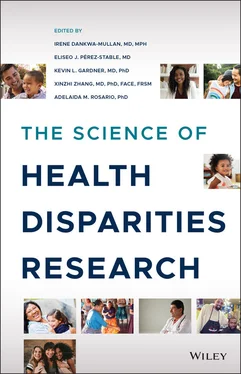Maria F. Lima CUNY School of Medicine The City College of New York New York, NY USA
Benmei Liu National Cancer Institute National Institutes of Health Bethesda, MD USA
Jacqueline J. Lloyd National Institute on Drug Abuse National Institutes of Health Rockville, MD USA
Jill A. Marsteller Johns Hopkins Center for Health Equity Johns Hopkins University Baltimore, MD USA
Linda Sprague Martinez School of Social Work Boston University Boston, MA USA
David O. Meltzer Department of Medicine The University of Chicago Chicago, IL USA
Priscah Mujuru National Institute on Minority Health and Health Disparities National Institutes of Health Bethesda, MD USA
Anup K. Nair Phoenix Epidemiology and Clinical Research Branch, National Institute of Diabetes and Digestive and Kidney Diseases National Institutes of Health Phoenix, AZ USA
Emily Nangle Department of Epidemiology, School of Global Public Health New York University New York, NY USA
Anna M. Nápoles National Institute on Minority Health and Health Disparities National Institutes of Health Bethesda, MD USA
Uchenna J. Ndulue Boston Public Health Commission, Child Adolescent and Family Health Bureau Boston, MA USA
Tung T. Nguyen School of Medicine University of California San Francisco, CA USA
Abigail Ortiz Southern Jamaica Plain Health Center Jamaica Plain, MA USA
John E. Pachankis School of Public Health Yale University New Haven, CT USA
William V. Padula Department of Pharmaceutical and Health Economics, School of Pharmacy University of Southern California Los Angeles, CA USA; Leonard D. Schaeffer Center for Health Policy and Economics Los Angeles, CA USA
Jane Pang Pacific Islander Health Partnership Huntington, Beach, CA USA
Nina S. Parikh Department of Epidemiology, School of Global Public Health New York University New York, NY USA
Eliseo J. Pérez‐Stable National Institute on Minority Health and Health Disparities National Institutes of Health Bethesda, MD USA
Robert L. Phillips American Board of Family Medicine Washington, DC USA
Latrice C. Pichon Social and Behavioral Sciences University of Memphis Memphis, TN USA
Tanjala S. Purnell Johns Hopkins Center for Health Equity Johns Hopkins University Baltimore, MD USA
Nishadi Rajapakse National Institute on Minority Health and Health Disparities National Institutes of Health Bethesda, MD USA
Amelie G. Ramirez Institute for Health Promotion Research University of Texas Health Science Center San Antonio, TX USA
Neda Ratanawongsa Division of General Internal Medicine, Department of Medicine at Zuckerberg, San Francisco General Hospital University of California‐San Francisco San Francisco, CA USA; Center for Vulnerable Populations University of California‐San Francisco San Francisco, CA USA; San Francisco Department of Public Health San Francisco, CA USA; Richard Fine People’s Clinic San Francisco, CA USA
William T. Riley Office of Behavioral and Social Sciences Research National Institutes of Health Bethesda, MD USA
Erik J. Rodriquez National Heart, Lung, and Blood Institute National Institutes of Health Bethesda, MD USA
Adelaida Rosario Commissioned Corps Headquarters Office of the Surgeon General Rockville, MD USA
Charles N. Rotimi Center for Research on Genomics and Global Health, National Human Genome Research Institute National Institutes of Health Bethesda, MD USA
Melanie D. Sabado‐Liwag National Institute on Minority Health and Health Disparities National Institutes of Health Bethesda, MD USA
Mariana Sanchez Robert Stempel College of Public Health and Social Work Florida International University Miami, FL USA
Milda R. Saunders Department of Medicine The University of Chicago Chicago, IL USA
Dean Schillinger Division of General Internal Medicine, Department of Medicine at Zuckerberg, San Francisco General Hospital University of California‐San Francisco San Francisco, CA USA; Center for Vulnerable Populations University of California‐San Francisco San Francisco, CA USA; Richard Fine People’s Clinic San Francisco, CA USA
Daniel Shriner Center for Research on Genomics and Global Health, National Human Genome Research Institute National Institutes of Health Bethesda, MD USA
Sarah C. Stallings Vanderbilt University Medical Center Nashville, TN USA; Meharry‐Vanderbilt University Nashville, TN USA
Anita L. Stewart Institute for Health and Aging, Center for Aging in Diverse Communities University of California San Francisco, CA USA
Andrea Williams Stubbs St. Jude Children’s Research Hospital Memphis, TN USA
Meryl Sufian National Institute on Minority Health and Health Disparities National Institutes of Health Bethesda, MD USA
Derrick C. Tabor National Institute on Minority Health and Health Disparities National Institutes of Health Bethesda, MD USA
Sora Park Tanjasiri University of California Irvine, CA USA
Claudia Toledo‐Corral Department of Preventive Medicine, Keck School of Medicine University of Southern California Los Angeles, CA USA
Hannah A. Valantine Scientific Workforce Diversity, Office of the Director National Institutes of Health Bethesda, MD USA
Elizabeth Vang Department of Preventive Medicine, Keck School of Medicine University of Southern California Los Angeles, CA USA
Salina P. Waddy Department of Neurology, Atlanta Veterans Administration Decatur, GA USA
Nina Wallerstein College of Population Health University of New Mexico Albuquerque, NM USA
Joan Wasserman Uniformed Services University of the Health Sciences Bethesda, MD USA
Kristina Weeks Johns Hopkins Center for Health Equity Johns Hopkins University Baltimore, MD USA
Roy E. Weiss Miller School of Medicine University of Miami Miami, FL USA
Marquitta White School of Medicine University of California San Francisco, CA USA
Consuelo H. Wilkins Vanderbilt University Medical Center Nashville, TN USA; Meharry‐Vanderbilt University Nashville, TN USA
Kesi Williams National Institute on Minority Health and Health Disparities National Institutes of Health Bethesda, MD USA; Center for Research to Advance Community Health (REACH) UT Health San Antonio San Antonio, TX USA
Jessamine Winer‐Jones IBM Watson Health International Business Machines (IBM)Corporation Herndon, VA USA
Cheryl A. Winkler Frederick National Laboratory for Cancer Research National Cancer Institute National Institutes of Health Frederick, MD USA
Kent Woo NICOS Chinese Health Coalition San Francisco, CA USA
Shumei Yun Resolve to Save Lives and Vital Strategies New York, NY USA
Xingyou Zhang US Bureau of Labor Statistics Washington, DC USA
Xinzhi Zhang Division of Clinical Innovation, National Center for Advancing Translational Sciences National Institutes of Health Bethesda, MD USA
January 10, 1992, the National Institutes of Health (NIH) published within its Guide for Grants and Contracts , special instructions to applicants regarding implementation of new policies concerning the inclusion of women and minorities in clinical research study populations. Many of the senior authors of chapters in this seminal volume and I were among those who advocated strongly for this, then, new policy. It spoke to the under‐representation of racial and ethnic minorities in the science of the times, and strongly argued for closer attention to their inclusion in NIH‐sponsored research as a means of improving said science. The introductory chapter to this volume chronicles the circumstances that led to this policy change, as well as the ensuing response on the part of the NIH and Department of Health and Human Services to its implementation.
Читать дальше












